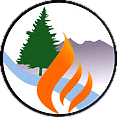Click here to download the printable version of this press release (.docx)
Visit our Flickr page for photos of the Pilot Project
Flagstaff, AZ — As part of the Flagstaff Watershed Protection Project (FWPP) that was recently approved by City voters to reduce the threat of severe wildfire in critical watersheds, the Coconino National Forest and City of Flagstaff conducted a pilot project in the Dry Lake Hills watershed off Schultz Pass Road (Forest Road 420). The thinned areas and slash piles are visible from the Arizona Trail.
This project occurred on approximately 10 acres to assess impacts and capabilities of logging equipment – a harvester and a self-leveling feller-buncher – on steep slopes and to assess slash-piling methods. Specialists determined how this equipment maneuvers on the slopes, opportunities to limit soil disturbance, and best methods for stacking slash so it could be consumed efficiently during prescribed burning.
Lessons learned from this pilot project will be used for larger-scale planning in the FWPP.
The debris and slash will be burned within the next two years when the material has dried enough to burn thoroughly, and will most likely occur in the winter when there is adequate moisture to isolate the fire.
To further assess ecological effects, the Ecological Restoration Institute (ERI) has established monitoring plots on the site and will be used to track effects on forest structure, fuel dynamics, canopy cover and soil function.
The pilot project is in an area where treatments have already been approved by a previous National Environmental Policy Act (NEPA) analysis. Analysis for new areas of treatment within the FWPP is still underway.

